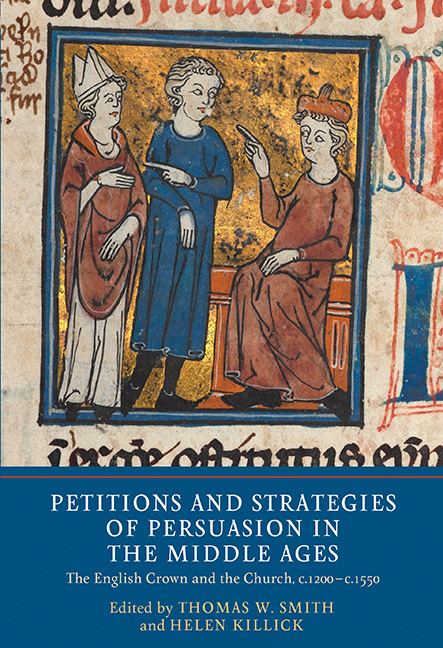 Petitions and Strategies of Persuasion in the Middle Ages
Petitions and Strategies of Persuasion in the Middle Ages Book contents
- Frontmatter
- Dedication
- Contents
- Contributors
- Foreword
- Acknowledgements
- List of Abbreviations
- Introduction: Medieval Petitions and Strategies of Persuasion
- 1 Blood, Brains and Bay-Windows: The Use of English in Fifteenth- Century Parliamentary Petitions
- 2 Petitioners for Royal Pardon in Fourteenth-Century England
- 3 The Scribes of Petitions in Late Medieval England
- 4 Patterns of Supplication and Litigation Strategies: Petitioning the Crown in the Fourteenth Century
- 5 Petitions of Conflict: The Bishop of Durham and Forfeitures of War, 1317–1333
- 6 A Tale of Two Abbots: Petitions for the Recovery of Churches in England by the Abbots of Jedburgh and Arbroath in 1328
- 7 ‘By Force and Arms’: Lay Invasion, the Writ de vi laica amovenda and Tensions of State and Church in the Thirteenth and Fourteenth Centuries
- 8 The Papacy, Petitioners and Benefices in Thirteenth-Century England
- 9 Playing the System: Marriage Litigation in the Fourteenth Century
- 10 Killer Clergy: How did Clerics Justify Homicide in Petitions to the Apostolic Penitentiary in the Late Middle Ages?
- Index
Introduction: Medieval Petitions and Strategies of Persuasion
Published online by Cambridge University Press: 20 August 2020
- Frontmatter
- Dedication
- Contents
- Contributors
- Foreword
- Acknowledgements
- List of Abbreviations
- Introduction: Medieval Petitions and Strategies of Persuasion
- 1 Blood, Brains and Bay-Windows: The Use of English in Fifteenth- Century Parliamentary Petitions
- 2 Petitioners for Royal Pardon in Fourteenth-Century England
- 3 The Scribes of Petitions in Late Medieval England
- 4 Patterns of Supplication and Litigation Strategies: Petitioning the Crown in the Fourteenth Century
- 5 Petitions of Conflict: The Bishop of Durham and Forfeitures of War, 1317–1333
- 6 A Tale of Two Abbots: Petitions for the Recovery of Churches in England by the Abbots of Jedburgh and Arbroath in 1328
- 7 ‘By Force and Arms’: Lay Invasion, the Writ de vi laica amovenda and Tensions of State and Church in the Thirteenth and Fourteenth Centuries
- 8 The Papacy, Petitioners and Benefices in Thirteenth-Century England
- 9 Playing the System: Marriage Litigation in the Fourteenth Century
- 10 Killer Clergy: How did Clerics Justify Homicide in Petitions to the Apostolic Penitentiary in the Late Middle Ages?
- Index
Summary
In 2009 Mark Ormrod, Gwilym Dodd and Anthony Musson broke new ground in the study of supplications in the Middle Ages with their edited volume Medieval Petitions: Grace and Grievance. Inspired by the completion of an AHRC-funded project to catalogue, digitise and study the SC 8 series of ‘Ancient Petitions’ preserved in The National Archives at Kew, Medieval Petitions tapped a rich vein of scholarship on supplications in medieval England and at the papal curia and helped to open up a field of study that has continued to flourish in the following decade. Broadly, there exist two strong traditions of research on petitions to the English crown, on the one hand, and ecclesiastical, specifically papal, petitions, on the other. Since 2009 a number of works have pushed the field in new directions. New research on petitions to the crown has illuminated aspects of petitioning such as supplications for royal pardon, women's petitions, multiple-clause petitions, petitions of complaint, the language of petitioning and the drafting process, as well as more general aspects of the processes and mechanisms of petitioning. These interpretative studies have also been supplemented by the publication of new documents in the form of the early common petitions presented to the English parliament. In the separate scholarly tradition on ecclesiastical supplications, new work has explored petitions regarding marriage, petitions for papal trade licences, the impact of petitioning on papal crusade diplomacy, the roles of proctors and more general aspects of petitioning. A particularly fruitful avenue of research explores supplications to the papal penitentiary, which is illuminating many new aspects of medieval life and the Church. The publication of new documents has also expanded the source base for this strand in the form of late medieval petitions to the penitentiary, as well as papal supplications from the University of Paris.
Despite common themes and the rich comparative possibilities, however, these two scholarly traditions have often remained separate, primarily because the Church and the crown had their own discrete – and extremely complex – systems of petitioning. Recently, however, a number of scholars have pioneered approaches that traverse the boundaries in the attempt to combine the two strands. Through her work on the fourteenth-century Roman Rolls in The National Archives, Barbara Bombi is pointing the way in the study of the interface between royal and papal supplicatory systems.
- Type
- Chapter
- Information
- Petitions and Strategies of Persuasion in the Middle AgesThe English Crown and the Church, c.1200–c.1550, pp. 1 - 10Publisher: Boydell & BrewerPrint publication year: 2018


